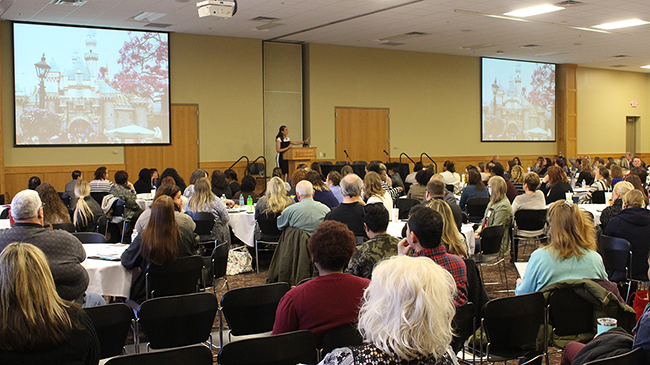NEW ALBANY, Ind. – IU Southeast received a $300,000 grant from the Justice Department’s Office on Violence Against Women (OVW) to aid in the Indiana University Southeast Reduce Sexual Violence and Stalking Project and to be used over a three-year period.
OVW’s Grants to Reduce Sexual Assault, Domestic Violence, Dating Violence and Stalking on Campus Program support higher education institutions in implementing comprehensive, coordinated responses to violent crimes on campus through partnerships with victim services providers and justice agencies. The recipients of these grants work collaboratively with local law enforcement and prosecutors, campus athletic programs, Greek life organizations, and off-campus victim services, as each plays a critical role in making campuses safer.
“We are honored to receive this impressive grant, and while we are currently ranked as one of the safest college campuses in the nation, we will employ this federal funding to both maintain and improve our on-campus safety record and also serve as a model for other institutions attempting to improve their own student wellbeing procedures,” said IU Southeast Chancellor Dr. Ray Wallace.
IU Southeast was selected as the Indiana University institutional nominee to apply for the grant and is the only institution in Indiana to receive it. The grant will be used to fund several initiatives to reduce sexual violence including supporting the county sexual assault response team and providing bystander intervention courses and training for students, guidance counselors, teachers, campus and community law enforcement, university personnel and others. The grant will also be used for the coordination of the annual human trafficking awareness summit with students and community partners, to develop effective outreach to engage specific student populations and to work with community partners such as the Floyd County Prosecutors Office and the Center for Women and Families.
“The OVW grant will help IU Southeast address issues of personnel, funding, training, broadening campus and community engagement for prevention and response, and targeting high-risk populations,” said Dr. Seuth Chaleunphonh, dean of Student Life. “Through this funding, we will be able to increase the urgency of identifying and referring survivors for social and emotional support as a protective factor in primary prevention. Our commitment to being one of the safest campuses in the country requires us to decrease incidents of sexual assault as well as prevent re-victimization through a strategy that includes bystander intervention, healthy relationships education, and self-efficacy programming. We are excited about the opportunity to work with our community partners in this effort.”

Survivor and activist Jessa Dillow Crisp addresses a large crowd of attendees at the 2018 Southern Indiana Human Trafficking Awareness Conference.
See more information on the IU Southeast Reduce Sexual Violence and Stalking Project initiatives below:
1) Create county sexual assault response team (coordinated community response), in compliance with Indiana Code relating to SART (IC16-21-8-2), and in collaboration with the Prosecutor’s office and Center for Women and Families, to establish protocols for response, treatment, and advocacy for all victims and review ways to share database/reporting system;
2) Partner with Center for Women and Families to provide advocacy representatives regular onsite access to students; regular opportunities victim/survivor support group(s); and integrate Center for Women into planning, assessment, and policy/resource development;
3) Provide Green Dot bystander training and healthy relationships education for students and local guidance counselors/teachers, including high-risk audiences like Housing, Greek Life, and Athletics students;
4) Develop and offer a one-credit hour course for bystander intervention;
5) Utilize CRM (Customer Relationship Management) technology to ensure all new students participate in a mandatory prevention and education program (sexual violence prevention online module and Sexual Misconduct: Rights, Options, and Resource Guide);
6) Develop peer educator programming funded by peer prevention scholarships to promote presentations by community experts, recruitment, marketing, and social norming campaign conducted by peer educators;
7) Coordinate annual human trafficking awareness summit with students and community partners to address hyper-masculinity, self-efficacy, gender role adherence, and hostility toward women;
8) Develop effective outreach to engage special populations such as LGBTQ students, multi-cultural students, veterans, and students with a disability in prevention and response;
9) Offer staff and faculty training opportunities to increase knowledge and skills for victim advocacy;
10) Provide training support to campus and community law enforcement to more effectively respond to sexual violence and stalking, and opportunities to develop positive relationships with students;
11) Transition disciplinary board members training from once per year to ongoing, monthly topical trainings such as effects of trauma, credibility, range of sanctions, interim measures; policy, definitions, and case studies;


